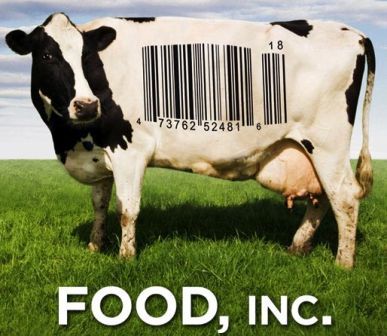MacDonald is a mass production of food. Technology has been used in order to aide this mass production, with little attention to the health and safety of the people and the environment. It’s cheaper, feeds more people, easier and faster.
Industrial agriculture is very much the same. It’s MacNaturebreeds! We’re relying on a few highly productive livestock breeds and crops for the same reason many fast food restaurants do: the money-making, profitable business of it all.
With industrial agriculture, humans dominate instead of balance. We control and modify crops and breeds with chemicals and impose unnatural technology.
For those who are like me, and are unaware of the difference between ‘industrial’ agriculture and ‘sustainable’ agriculture, I googled and paraphrased it for you.
Industrial agriculture is basically a kind of modern farming to the ‘industrialized’ production of livestock and crops. Political and economical influences are prevalent in this industry.
Sustainable agriculture is simply agriculture that is socially fair to the environment and to farming communities. It is also humane.
Clearly, the latter is the better choice. Naturally (no pun intended), we should practice the kind of agriculture that is beneficial to all – in terms of farmers, consumer’s health and the environment.
To be fair, industrial agriculture does have its benefits. It’s a cheap way to produce abundant amounts of food – making it more available and frees farm labouring. With the number of humans on this planet… it’s certainly appealing. Not to mention profitable as well. A child dies every five seconds due to hunger related issues, and industrial agriculture is perceived to be a way to lift those out of hunger and poverty.
And while we may not be too concerned about farmers – now countries must also spend money to sustain them (even though, really, it was their fault to begin with) and drives thousands of farmers to their death. The soil eventually becomes unusable and infertile, due to chemical overdose.
After watching Food Inc., it’s easy to see that industrial agriculture is a global crisis. We’re being lied about our food and how it’s made, hiding the unethical and unsanitary ways about our livestock and crops. It creates/promotes
- diabetes and obesity
- factory farming with inhumane conditions – also polluting communities
- pesticides (associated with cancers, autism and other neurological disorders)
- denying farmers their rights
- disgusting, artificial food
“There are many arguments against organic and sustainable agriculture, namely that they can’t produce an economy of scale to feed our rapidly growing world population. Another criticism is that there isn’t enough natural fertilizer to maintain current yields and chemicals must be used.
There is also a concern that the low prices we’ve become accustomed to won’t be there with organic agriculture. From the evidence that I’ve found, none of these arguments stand up to scrutiny and organic farming practices can indeed maximize the benefits and minimize the downsides.” (Allan Warren, Life More Natural)
Huh. So it seems as if industrial agriculture really doesn’t have a leg to stand on at all.
The topic of this bioblog is "feeding a growing population" versus "conserving biodiversity". But, we don't have to choose, with sustainable agriculture - BOTH are possible!
So tell me what you think. You want to buy food that’s been genetically modified to grow faster, greater, bigger and cheaper? Or you want to eat food that’s nutritionally healthy, good and wholesome?
I commented on Dora's blog and Inggrid's blog.
My references are:
Chowdhury, Debasish Roy. "The Hungry Won't Live If Farms Die." China Daily Website - Connecting China Connecting the World. China Daily, 23 May 2008. Web. 28 Dec. 2010. <http://www2.chinadaily.com.cn/opinion/2008-05/23/content_6728427.htm>.
Horrigan, Leo. "What's Wrong with Industrial Agriculture." Organic Consumers Association. Organic Consumers Association, 20 Mar. 2002. Web. 28 Dec. 2010. <http://www.organicconsumers.org/Organic/IndustrialAg502.cfm>.
"Industrial Agriculture | Economy Watch." World, US, China, India Economy, Investment, Finance, Credit Cards | Economy Watch. Ed. Stanley StLab. Economy Watch. Web. 28 Dec. 2010. <http://www.economywatch.com/agriculture/types/industrial.html>.
Rae, Jenna. "Effects of Industrial Agriculture of Crops on Water and Soil - a Knol by Jenna Rae." Knol - a Unit of Knowledge: Share What You Know, Publish Your Expertise. Knol Beta, 28 Apr. 2009. Web. 28 Dec. 2010. <http://knol.google.com/k/effects-of-industrial-agriculture-of-crops-on-water-and-soil#>.
Warren, Allan. "Organic vs Industrial Agriculture: Can We Have the Best of Both?" Life More Natural. Life More Natural, 7 May 2009. Web. 28 Dec. 2010. <http://lifemorenatural.com/?p=1155>.



.jpg)






